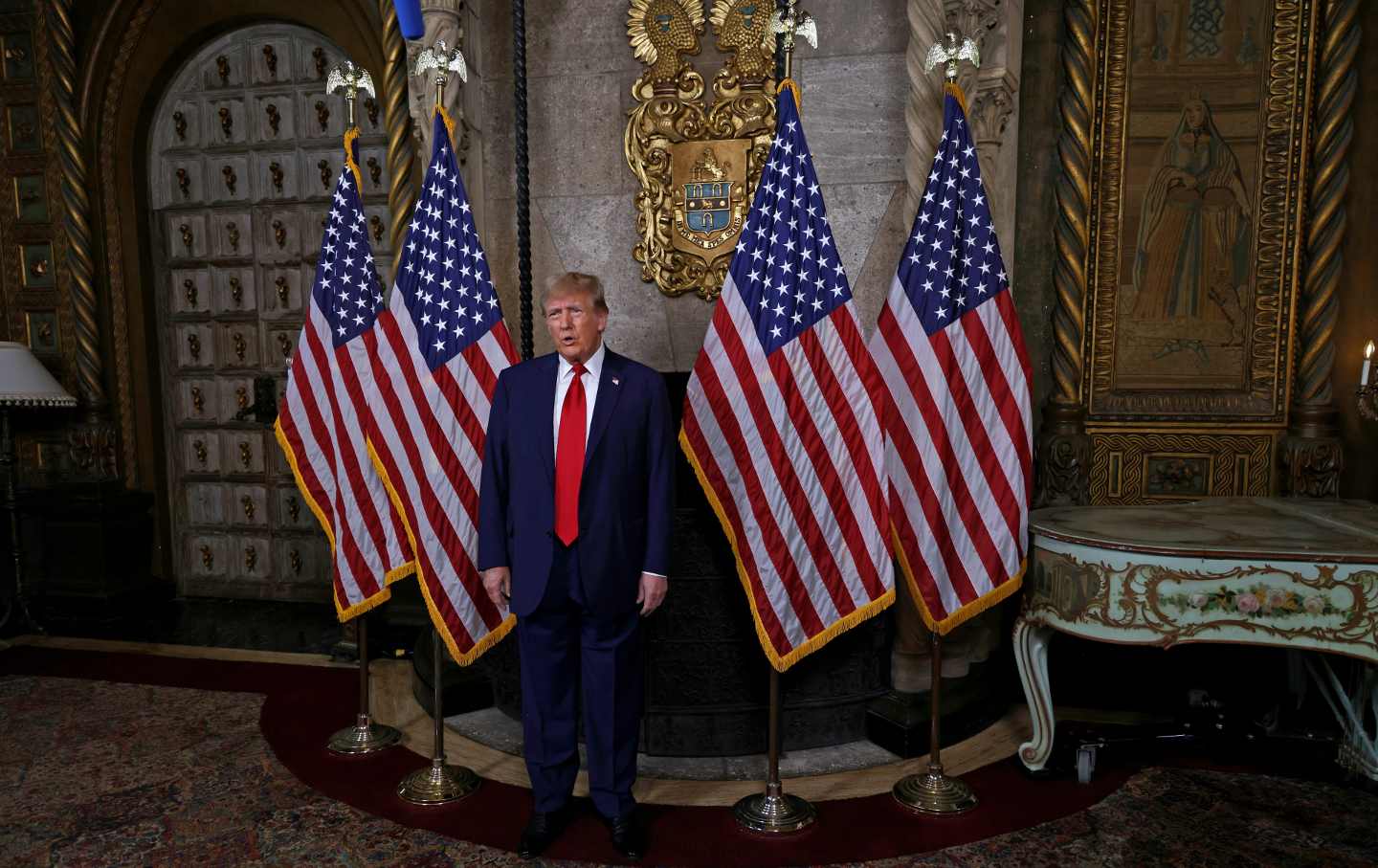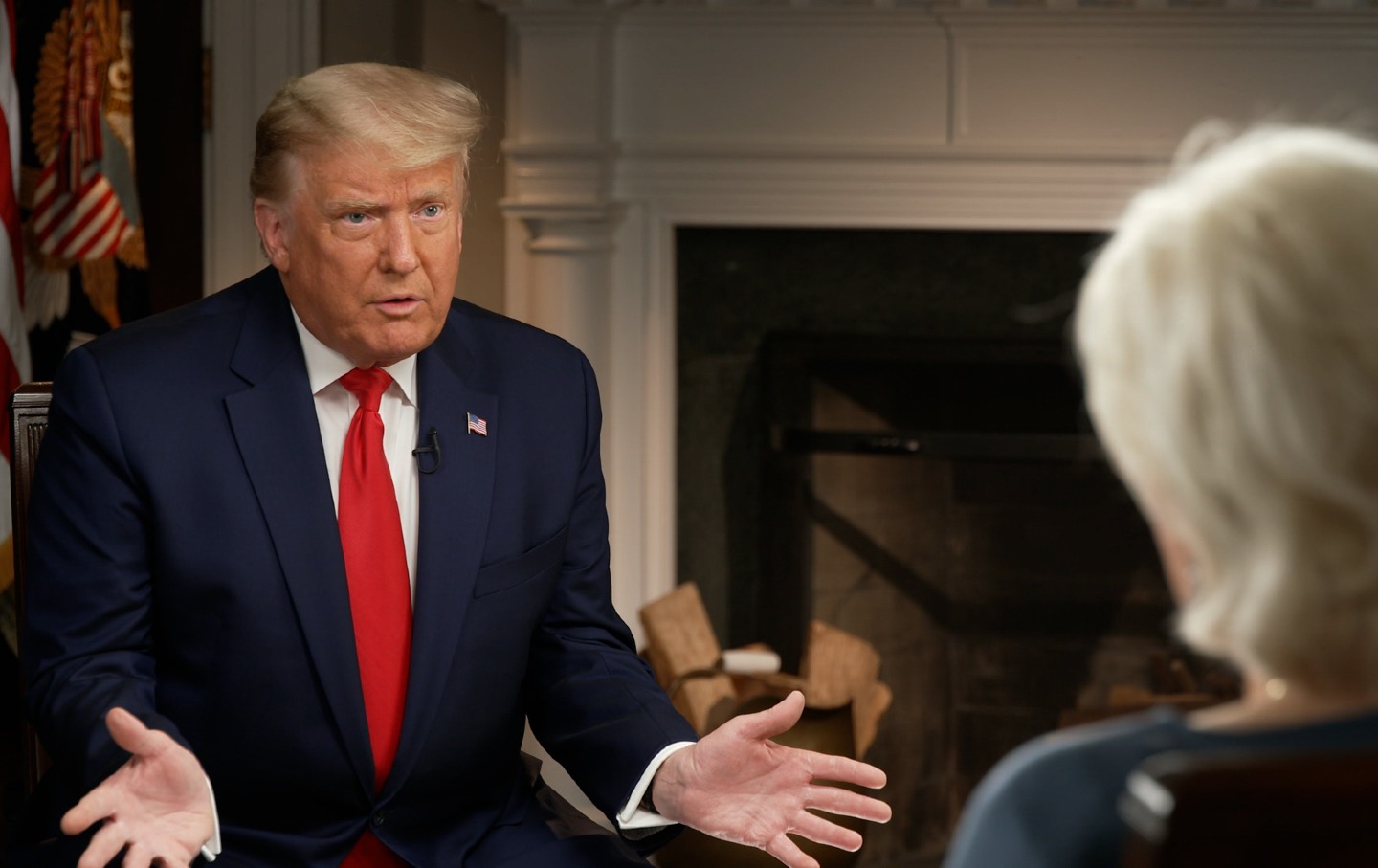Trump Is Winning This Election Right Now. Here’s Why.
It’s not just because of Biden. Trump’s campaign has made some smart and effective decisions.

Former President Donald Trump speaks in the library at Mar-a-Lago on March 4, 2024, in Palm Beach, Fla.
(Alon Skuy / Getty Images)One of the most striking, and seemingly consequential, lessons from the 2022 midterms was the unique weakness of Donald Trump’s brand of politics. While hardly any faction of the Republican Party can be said to have done well that year, it was easy to notice that the candidates who aligned themselves the most closely with the former president did particularly poorly. From Kari Lake and Blake Masters in Arizona to Doug Mastriano and Mehmet Oz in Pennsylvania, Trump’s handpicked candidates struck out nearly across the board, losing decisively in swing states despite an environment that should have been favorable to them.
As many commented at the time, this seemed to have dire implications for Trump’s own electability in 2024. His brand of politics looked unsalvageably toxic in the states that would decide the election. For the GOP, the choice appeared stark: move on, or lose.
What a difference 16 months makes. For almost a full half-year, Donald Trump has had a clear lead in the 2024 presidential polls, both nationally and in the same swing states where his acolytes were crushed in the midterms. One might think that this could be a result of the country moving to the right after 2022, but it’s not. Few down-ballot Republicans are matching Trump’s numbers. The GOP’s candidates are currently lagging in essentially every competitive Senate race. Some of them are trailing by substantial margins in states where Trump has a strong lead over Biden, like Arizona and Pennsylvania. It all points to a possibility that is still hard to imagine: that Trump is actually a stronger candidate than his fellow Republicans.
This raises an obvious question: how?
So far, people tackling this puzzle, myself included, have focused the bulk of our attention on Joe Biden’s flawed candidacy and struggling campaign to explain what’s happening. As this story goes, Americans have not become any more conservative than they have been before—in fact, the dual backlash to Trump and the Supreme Court’s Dobbs decision has actually put liberalism in one of its strongest positions in a generation. But Biden is simply so old, unpopular, and fundamentally ill-suited to the moment that he completely washes away these advantages.
This story is equal parts comforting (in that it rejects the idea that Americans have moved substantially to the right) and frustrating (in that it makes you wish that one man’s ego was not jeopardizing the race this much), and I believe that it does do a lot to explain why we are where we are.
But it doesn’t explain everything. In elections, it always takes two to tango. For as much as Biden’s vulnerabilities have helped Trump, they wouldn’t be translating into support for him unless he was doing something to make himself look compelling in comparison. This part of the election—Trump’s actual campaign and how it’s been effective—hasn’t received nearly as much attention compared to his courtroom sagas or Biden’s missteps. It might not end up being as important to the final outcome as those two things. But for those of us who wish to see Trump defeated, understanding it is still crucial.
The first big thing benefitting Trump in this race compared to his prior ones is something that, ironically enough, was intended to hurt him: his lower profile. The panicked efforts to deplatform the 45th president following January 6 have done their work. While Trump is still constantly in the news, he’s not nearly as culturally pervasive as he was in 2016 (when the media covered him obsessively) or 2020 (when he was an incumbent president). Despite Elon Musk’s pathetic efforts to lure him back to Twitter, Trump has, with one exception, been off the platform for more than three years. The posts that once sparked conversations and dominated political discussions are gone, cordoned away from the public consciousness in the internet backwater of Truth Social. The voters who seem to need constant reminding about why they don’t like Trump are no longer receiving those reminders nearly as frequently as they once did.
As a result, the former president is increasingly viewed as more of a concept than an actual person. Rather than seeing him as an individual politician with a specific plan for the country, many now associate him with a set of feelings they remember from his tenure. These feelings are as follows: Economy Good, Wars Not Happening, and Mean Tweets. (Terrible Pandemic somehow doesn’t penetrate as much, perhaps because Democrats don’t want to talk about Covid either.)
The fact that some swing voters feel this way doesn’t necessarily mean they have an entirely positive view of Trump’s record. While many right-wingers bring up the objection just to mock it, Trump’s mean tweets were no small thing—people don’t like having a president they can’t stand on a personal level. But voters appear to see the possibility of his return as a series of trade-offs. Since they don’t have faith in Biden’s ability to create peace or prosperity, Trump presents himself as someone who can bring both of those things, even at the cost of being personally annoying. So far, this is a trade that many desperate voters seem willing to make.
Besides just staying out of the spotlight, which may or may not be entirely unintended on their part, how much credit does the Trump campaign deserve for the fact that people are thinking about the election this way? It’s a bit of a mixed bag. In general, much of Trump’s messaging does hit on the themes he needs to look preferable to Biden. It’s nothing revolutionary, but material that calls on the popular economy and (relative) lack of overseas conflict during his tenure helps construct a favorable dynamic for his candidacy, even if it’s not going to win over those who truly despise him.
This can only do so much, though. Throughout the campaign, Trump has never been able to stick with a consistent bread-and-butter appeal along these lines without veering off into territory that reframes the election in an entirely different light. In one moment, this may see him threatening to suspend the Constitution. In the next, he’s promising to execute generals. In another, he encourages Russia to attack NATO. This compulsion to put his foot in his mouth has always been one of Trump’s terminal weaknesses, and it’s likely why the bump he’s seen in the polls since last October hasn’t turned into a true polling surge.
If Trump does win, it will be because he sticks to simple themes, not because of his policies. Few have looked at Trump’s policy page, which is more than understandable if you want to follow the actual election. Trump has never been a policy-oriented politician, after all. But if you’re looking for a case study on the brain rot that has afflicted the right-wing intellectual class since his election in 2016, there are few better primary sources. In addition to being hardline conservative, it’s also full of ideas that range from laughably unserious to batshit insane. There are proposals for 60 percent tariffs on foreign imports. There are plans for the construction of megacities across the Great Plains, Magnitogorsk-style. There’s even a section about flying cars.
Trump’s staffers might have some grand vision behind these “policies.” But voters don’t want to go all-out in turning the country into The Jetsons by 2029. They want prices to go down. Creating the impression that Trump will focus on the former at the expense of the latter will only hurt his image in places where it should otherwise be strong.
There is one aspect of Trump’s campaign that is legitimately effective on its own: its attacks on Biden’s age. According to Dr. Charles Bullock, professor of political science at the University of Georgia, Trump’s campaign has a major advantage over Biden’s in attacks on competency and age for one reason: consistency. As Bullock noted when I spoke to him, Republicans have been attacking Biden over his age ever since he entered the race in 2019. (So have other Democrats.) This may not have worked initially, but it did create a strong and simple narrative in the minds of voters—one that has come back to bite Biden again and again throughout his presidency.
Popular
“swipe left below to view more authors”Swipe →In comparison, age had never really been a focus of Democratic attacks on Trump. For them to suddenly start attacking him over his verbal slip-ups makes them come across as disingenuous, doesn’t play into any pre-existing narrative, and seemingly concedes the point about Biden’s ineptitude. No matter how similar Trump and Biden may be in their ages and capabilities, this gap in narrative set-up has made all the difference in terms of voter perceptions. Now, voters overwhelmingly see Trump as more capable of handling the job of the presidency than his counterpart.
So, in summary, these are the sharpest moves by the Trump campaign so far: They’ve made him less culturally pervasive, they’ve avoided talking about his policies, and they’ve been able to effectively attack their unpopular opponent on one issue.
If this all sounds like I’m damning Trump with faint praise, well, I am. He’s not a strong candidate by any means. But the only thing worse than an unpopular candidate who is being managed correctly is an unpopular candidate who is being managed poorly, which Trump, at the very least, does not seem to be right now. His personal favorability is the highest it’s been in years. It may still not be anywhere near high enough to defeat a strong Democratic alternative, but it may very well be enough to beat the current president.
Unless something massively changes—and it very well could with Trump—winning this year is going to be a backbreaking slog for Joe Biden. Since he’s the one who’s insisting on it, he sure as hell better be up for it.
Hold the powerful to account by supporting The Nation
The chaos and cruelty of the Trump administration reaches new lows each week.
Trump’s catastrophic “Liberation Day” has wreaked havoc on the world economy and set up yet another constitutional crisis at home. Plainclothes officers continue to abduct university students off the streets. So-called “enemy aliens” are flown abroad to a mega prison against the orders of the courts. And Signalgate promises to be the first of many incompetence scandals that expose the brutal violence at the core of the American empire.
At a time when elite universities, powerful law firms, and influential media outlets are capitulating to Trump’s intimidation, The Nation is more determined than ever before to hold the powerful to account.
In just the last month, we’ve published reporting on how Trump outsources his mass deportation agenda to other countries, exposed the administration’s appeal to obscure laws to carry out its repressive agenda, and amplified the voices of brave student activists targeted by universities.
We also continue to tell the stories of those who fight back against Trump and Musk, whether on the streets in growing protest movements, in town halls across the country, or in critical state elections—like Wisconsin’s recent state Supreme Court race—that provide a model for resisting Trumpism and prove that Musk can’t buy our democracy.
This is the journalism that matters in 2025. But we can’t do this without you. As a reader-supported publication, we rely on the support of generous donors. Please, help make our essential independent journalism possible with a donation today.
In solidarity,
The Editors
The Nation








